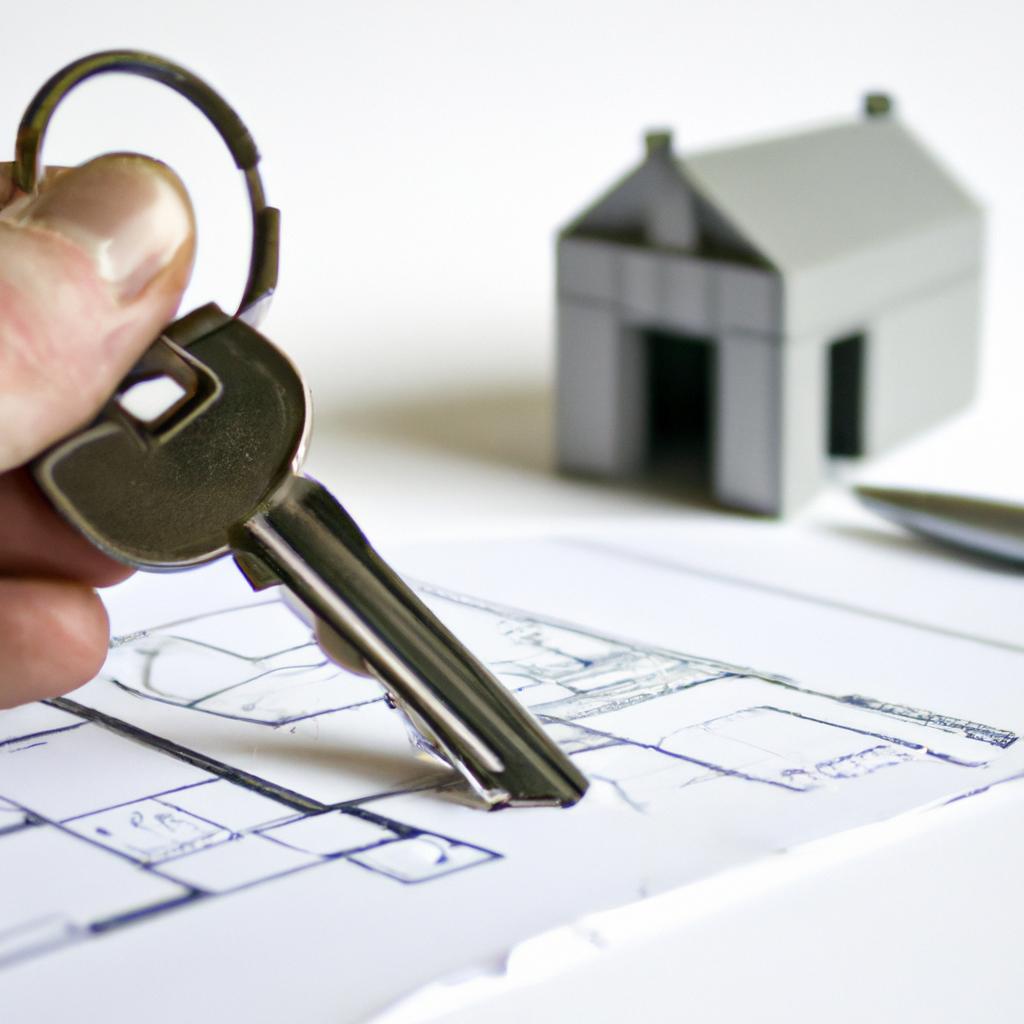As members of the esteemed Morgan Legal Group, situated in the bustling metropolis of New York City, we are well-versed in the intricate world of estate planning and property law. In this article, we shall delve into the essential steps and legal procedures one must undertake in order to obtain a new deed for a house. From navigating the complexities of documentation to ensuring compliance with local regulations, our expert guidance will lead you through the process with clarity and precision. Join us as we embark on this journey towards securing your rightful ownership of real estate.
Securing a New Deed for Your Property
To secure a new deed for your property, it is essential to follow the proper legal procedures to ensure that the transfer of ownership is valid and legally recognized. One of the first steps in obtaining a new deed for your house is to gather all the necessary documentation related to the property, including the original deed, any existing mortgages, and any other relevant paperwork.
Once you have gathered all the necessary documents, you will need to draft a new deed that clearly outlines the transfer of ownership from the current owner to the new owner. This document must comply with all local laws and regulations regarding property transfers. After the new deed is drafted, it must be signed by both parties and notarized to make it legally binding. Finally, the new deed must be filed with the appropriate government office, such as the county clerk’s office, to officially transfer ownership of the property. By following these steps diligently and ensuring that all legal requirements are met, you can successfully secure a new deed for your property.
Navigating the Legal Process of Obtaining a Deed Transfer
can seem like a daunting task, but with the right guidance, it can be a straightforward process. When looking to get a new deed for your house, it is essential to follow these steps:
- Begin by filing a deed transfer form with the appropriate county clerk’s office.
- Ensure all parties involved in the transfer sign the deed.
- Have the deed notarized to make it legally binding.
- Submit the deed transfer form along with any required fees to the county clerk’s office.
Once the deed transfer form has been filed, it is crucial to closely monitor the process to ensure it is completed in a timely manner. Additionally, seeking the assistance of an experienced real estate attorney can help streamline the process and provide peace of mind throughout the transfer. At Morgan Legal Group, we have years of experience guiding clients through the deed transfer process and can help ensure your transfer is completed correctly and efficiently.
Ensuring Proper Documentation and Compliance with Regulations
In order to ensure proper documentation and compliance with regulations when obtaining a new deed for your house, there are several important steps that must be followed. First and foremost, it is crucial to gather all necessary documentation relating to the property, including the current deed, survey, and any mortgage documents. This will help streamline the process and prevent any delays or errors.
Next, it is imperative to research the specific requirements and regulations in your area for obtaining a new deed. This may involve submitting an application to the local government office, paying any necessary fees, and providing proof of ownership. It is also recommended to seek the guidance of a qualified real estate attorney to ensure that all legal requirements are met and to avoid any potential pitfalls during the process.

Expert Guidance on Completing the Deed Transfer Process
When completing the deed transfer process for your home, it is essential to seek expert guidance to ensure that all legal requirements are met. At Morgan Legal Group, our team of experienced estate planning attorneys can provide you with the assistance you need to obtain a new deed for your house smoothly and efficiently. Our comprehensive knowledge of real estate law allows us to guide you through each step of the process, ensuring that your property transfer is completed accurately and in compliance with all relevant regulations.
Our attorneys can help you navigate the complexities of obtaining a new deed for your house by assisting you in gathering the necessary documentation, filling out the required forms, and overseeing the transfer of ownership. With our guidance, you can rest assured that your property transfer will be handled with the utmost care and attention to detail. Trust Morgan Legal Group to provide you with the expert legal advice you need to successfully complete the deed transfer process for your home.
Q&A
Q: What is a deed and why is it important for homeowners?
A: A deed is a legal document that shows ownership of a property and is essential for proving ownership and transferring the property to others.
Q: How can I get a new deed for my house?
A: To obtain a new deed for your house, you’ll need to contact your local county recorder’s office and follow their specific process for requesting a new deed.
Q: What information do I need to provide to get a new deed?
A: You’ll typically need to provide your current deed, proof of identity, and any relevant documentation related to the property in order to get a new deed.
Q: How long does it take to get a new deed for my house?
A: The timeline for getting a new deed can vary depending on the specific requirements of your county recorder’s office, but it typically takes a few weeks to process.
Q: Are there any fees associated with getting a new deed?
A: Yes, there are usually fees associated with obtaining a new deed for your house. The amount can vary depending on your location and the specific requirements of the county recorder’s office.
Wrapping Up
Now that you have learned the process of obtaining a new deed for your house, you can confidently navigate the legal procedures and ensure that your property ownership is secure. Remember, it is essential to keep all documents organized and up-to-date to avoid any potential issues in the future. With the right knowledge and resources, you can easily obtain a new deed and continue enjoying the benefits of homeownership. Good luck on your journey to securing your property rights!
 Title: How to Obtain a New Deed for Your House: A Comprehensive Guide
Title: How to Obtain a New Deed for Your House: A Comprehensive Guide
As a homeowner, it is crucial to have all your legal documents in order to avoid any complications or misunderstandings in the future. One of the most important documents for any homeowner is the deed, which acts as proof of ownership for your property. However, there may come a time when you need to obtain a new deed for your house due to certain circumstances. In this article, we will guide you through the process of getting a new deed for your house and provide practical tips to make the process smoother. So, let’s get started!
Understanding the Deed
Before diving into the process of getting a new deed, it is essential to understand what it is and its significance. A deed is a legal document that shows the transfer of ownership of a property from one person to another. It includes the names of the previous and current owners, the legal description of the property, and the signature of the previous owner. The deed is recorded in the county where the property is located and is kept as public record. This document serves as proof of property ownership and is required for any legal transaction involving the property.
Reasons for Obtaining a New Deed
There can be several reasons why you might need to obtain a new deed for your house. Some of the most common reasons include:
1. Change in Personal Details: If you have legally changed your name or title, you will need to update your deed to reflect the change.
2. Joint Ownership: If you initially owned the property alone, but now you want to add a partner or spouse to the ownership, a new deed is required to reflect the change in ownership structure.
3. Inheritance: In the event of the death of the owner, the deed will need to be updated to reflect the new legal owner.
4. Adding/Removing a Co-owner: If you want to add or remove someone from the deed, a new deed is necessary to record the change.
5. Errors in the Current Deed: If there are any errors or discrepancies in your current deed, it is advisable to obtain a new one to avoid any legal problems in the future.
Steps to Getting a New Deed for Your House
Now that you understand the importance of a deed and the reasons for obtaining a new one, let’s take a look at the steps involved in the process.
Step 1: Research Your Local Laws
The process of getting a new deed may vary from state to state, so it is crucial to research your local laws and regulations. Check with your local government office or hire a real estate attorney to guide you through the process.
Step 2: Gather Required Documents
Before approaching your local government office, make sure you have all the necessary documents in hand. These may include the current deed, proof of ownership, and any legal documents that support the reason for obtaining a new deed.
Step 3: Complete a New Deed Form
Next, you will need to complete a new deed form, which can be obtained from your local government office or online. The form will require you to provide the current property owner’s name and the new owner’s name, if applicable. Fill in all the necessary information accurately to avoid any mistakes.
Step 4: Sign and Notarize the Deed
Once you have completed the form, all parties involved in the ownership of the property must sign the deed. It is crucial to have the document notarized to make it legally binding. You can find a notary public at your local bank, library, or government office.
Step 5: Record the Deed
After the deed has been signed and notarized, it must be recorded at the county recorder’s office. This step is crucial as it makes the new deed officially recognized and kept as a public record.
Step 6: Make Copies of the Deed
Once the deed has been recorded, it is essential to make multiple copies for your records. You will need to keep the original copy in a safe and secure place, while the other copies can be distributed to the parties involved in the property’s ownership.
Practical Tips for Getting a New Deed
Here are some practical tips to keep in mind while obtaining a new deed for your house:
1. Seek Legal Assistance: It is always advisable to seek guidance from a real estate attorney when dealing with legal documents to ensure everything is correct and avoid any complications in the future.
2. Keep All Documents Safe: Make sure to keep all the necessary documents safe and secure, including the old deed and the new one, to avoid any confusion or loss of important paperwork.
3. Stay Organized: Keep track of all the important deadlines and paperwork throughout the process to ensure everything is completed on time and without any delays.
4. Keep the County Recorder’s Office Updated: In the event of any changes to your personal details, such as a change in name or contact information, make sure to update the county recorder’s office to avoid any future complications.
Benefits of Having a Correct and Up-to-Date Deed
Having a correct and up-to-date deed for your house can provide several benefits, such as:
1. Proof of Ownership: The deed serves as legal proof of ownership and is necessary for any real estate transactions.
2. Protection from Legal Issues: An accurate and up-to-date deed can help protect you from any legal problems that may arise in the future.
3. Easy Succession: In the event of your death, a correct and up-to-date deed can make it easier for your heirs to inherit the property.
First-Hand Experience
“I recently had to obtain a new deed for my house due to adding my spouse as a co-owner. The process was straightforward, but I made sure to seek assistance from a real estate attorney to ensure everything was done correctly. Keeping all the necessary documents organized and up-to-date made the process smoother. I highly recommend seeking professional help and staying organized throughout the process.”
Conclusion
In conclusion, obtaining a new deed for your house may seem like a daunting task, but with the right knowledge and guidance, it can be a straightforward process. Make sure to research your local laws and seek legal assistance, if needed. Keep all necessary documents organized and up-to-date, and don’t forget to make copies of the new deed for your records. Having an accurate and up-to-date deed can provide peace of mind and avoid any potential legal issues in the future.

